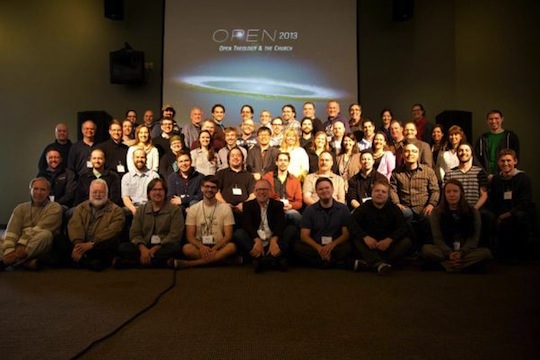We run our website the way we wished the whole internet worked: we provide high quality original content with no ads. We are funded solely by your direct support. Please consider supporting this project.
Reflecting on Open2013
 T. C. Moore has posted some of his reflections from the Open Theism conference. T. C. was one of several people who pulled this conference together and he did a great job. He’s also incredibly smart and very active in the open view community. Also, he’s a young church planter in Boston and I’m sure he’s grieving with the rest of that city (and the world) after the bombings yesterday. Our hearts are broken with him. Lord Jesus bring your peace and reveal your heart in the aftermath of this tragedy.
T. C. Moore has posted some of his reflections from the Open Theism conference. T. C. was one of several people who pulled this conference together and he did a great job. He’s also incredibly smart and very active in the open view community. Also, he’s a young church planter in Boston and I’m sure he’s grieving with the rest of that city (and the world) after the bombings yesterday. Our hearts are broken with him. Lord Jesus bring your peace and reveal your heart in the aftermath of this tragedy.
From T. C.’s blog:
The conference was held at Woodland Hills Church and senior pastor Greg Boyd was one of the conference’s keynote speakers.John Sanders and Thomas Jay Oord also delivered keynote talks. All three keynote speakers did a fantastic job, and each one provided substantive Q&A sessions following their talks. Dr. Oord even integrated Q&A into his presentation making it extraordinarily interactive. But one undeniable highlight of the conference was Jessica Kelley‘s sharing of Henry’s Story. Her testimony of how the Open View and the Warfare Worldview has helped her process her pain and preserved her faith in God was definitely the emotional pinnacle of the conference. Several of us on the planning team noted her poise during Q&A and her powerful gift of clear communication.
Category: General
Tags: Boston Bombings, Open Theism, T.C. Moore
Related Reading

How do you respond to Genesis 16:12?
The Lord describes Ishmael as “…a wild ass of a man, with his hand against everyone, and everyone’s hand against him.” According to most Old Testament scholars the Lord is describing Ishmael’s descendants as much as he is describing Ishmael himself. The Lord foresaw that the nation which would descend from Ishmael (cf. 21:18) would…

Lighten Up: I’m Not Worried Frank
http://youtu.be/kQFKtI6gn9Y?t=1m19s Well, my dear friend Frank Viola has been spouting off again about how my “logic will be shredded, excoriated, and turned into confetti before a watching world” when we host our debate on Open Theism this fall. I’m not too worried though, since Frank studied the art of debate in the clinic featured in…

How do you respond to Matthew 20:17–19?
“The Son of Man will be handed over to the chief priests and scribes, and they will condemn him to death; then they will hand him over to the Gentiles to be mocked and flogged and crucified, and on the third day he will be raised.” God knew perfectly the hearts of all the Jewish…

The Cosmic Dance: Why Will This Book Benefit Me?
Greg took a few moments to describe how he hopes you’ll benefit from The Cosmic Dance. Discover how various branches of science demonstrate that life itself is a delicate dance between order and chaos. You’ll find that we’re wired to live on the edge in a place of creativity, spontaneity and significance in the adventure…

Confronting Divine Determinism
Part of the fallen human condition inclines us to shirk our moral responsibility and accept that everything is predetermined, whether by God, the gods, fate, or blind chance. Various forms of determinism have been prevalent in most primitive religions, in much ancient philosophy, in most forms of Islam and even, most surprisingly, in much traditional…

Is it true you’re an “Open Theist” and that you don’t think God knows the future perfectly?
I am an “Open Theist” – though I honestly don’t care for the label, because as I’ll show, the uniqueness of this view isn’t in what it says about God but in what it says about the nature of reality. (I think it would be better to call us something like “Open Futurists.”) In any…
